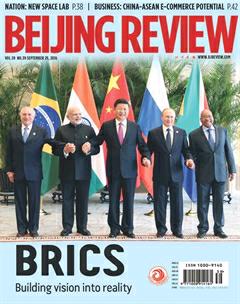A Narrowing Income Gap
2016-10-14ChinaYouthDailySeptember20
China Youth Daily September 20
A Narrowing Income Gap
China Youth Daily September 20
Migrant workers earned an average of 3,072 yuan ($461) per month in 2015, while the average monthly income half a year after graduation for students who left university in 2015 was 3,726 yuan ($559), according to statistics of the Ministry of Human Resources and Social Security. The figures show that college graduates’ average monthly income had shrunk from 1.8 times that of migrant workers at the end of 2005 to 1.2 times last year.
Some worry that the motivation to attend university may weaken if the income of university graduates declines to even less than that of migrant workers. It’s unnecessary to lament the narrowing income gap between university graduates and migrant workers,however, because such a change is the result of social progress and economic growth. When factory workers are guaranteed a decent income, and social security nets are well established, job seekers won’t have to vie for a highly limited number of white-collar jobs, but will have a wider variety of options. They can choose to attend vocational school after finishing junior middle school rather than scramble to enter university.
Meanwhile, as the value of a university diploma continues to depreciate, higher education institutions should reflect upon their educational models. As well as making efforts to equip students with knowledge and skills,universities should help young people to improve their competitiveness by facilitating their personal development. SCIENTIST WINS CHINA’S VERSION OF THE NOBEL PRIZE
Xue Qikun, a physicist at Tsinghua University, has won the physical science category of the inaugural Future Science Prize, China’s first non-governmental science award, which was initiated in January by a group of scientists and business leaders. The award recognizes Xue for his pioneering contribution to work on the quantum anomalous Hall effect, a discovery that has helped accelerate the information technology revolution and may lead to the development of low-powerconsumption electronics.
Xue, 52, comes from east China’s Shandong Province. He received his bachelor’s degree from the Shandong University in 1984 and his PhD from the Institute of Physics at the Chinese Academy of Sciences in 1994. He started teaching at the Department of Physics at Tsinghua University in 2005 and became dean of the department five years later. In 2013, Xue was appointed vice president of Tsinghua University.
The Future Science Prize, regarded by some as China’s version of the Nobel Prize, aims to boost scientific research in the nation. An awards ceremony will take place in Beijing in January 2017, at which Xue will receive $1 million in prize money.
“To meet the rising demand for Tibetan medicine, artificial cultivation of medicinal herbs is a must.”
Tashi Tsering, a researcher with the Traditional Tibetan Hospital of Tibet Autonomous Region in Lhasa, speaking about innovative ways to develop Tibetan medicine in a recent interview
“The consistent support provided by China to enhance integration of Least Developed Countries (LDCs) into the multilateral trading system is truly commendable.”
Yonov Frederick Agah, Deputy Director General of the World Trade Organization, commenting on China’s ongoing efforts to assist LDCs at the South-South Dialogue on LDCs and Development in Geneva on September 19
